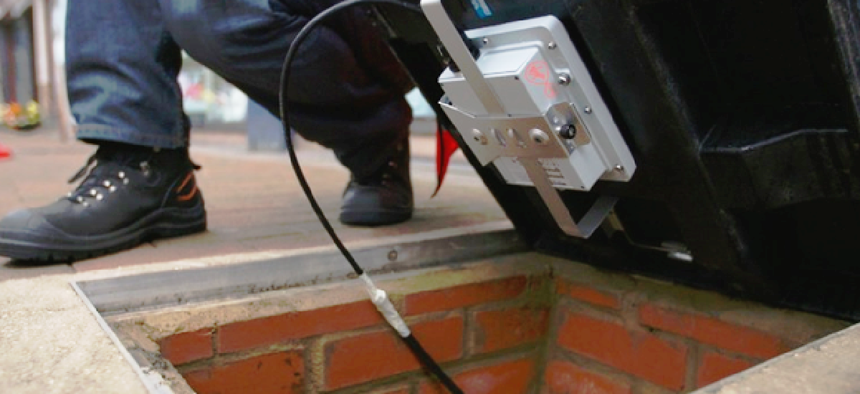Newest Wi-Fi option: Manholes


Connecting state and local government leaders
There is a new way cities can provide broadband to residents – via Wi-Fi hotspots embedded into manholes.
There is a new way cities can provide broadband to residents – via Wi-Fi hotspots embedded into manholes.
The “Smart-Wi-Fi Pavement” project is currently available in the small town of Chesham, the United Kingdom. It offers top speeds of up to 166Mbps, seven times the average U.K. broadband speed, with a radius of 87 yards (80 meters) according to a statement by Virgin Media, the service provider. The Wi-Fi is provided via a submerged access point covered by a rainproof resin. Android users can access the Wi-Fi via the Virgin Media WiFi Buddy app.
As in the United Kingdom, many U.S. cities and towns are taking advantage of a variety of innovative ways to provide Wi-Fi to residents and business. Plainville, Conn., for example, is in the process of providing Wi-Fi hotspots via street lamps, reported the Hartford Courant.
Of the 1,424 Plainville street lamps that will be outfitted with energy-efficient LED lights, 123 in select retail stretches in the town will be installed with Wi-Fi hotspot technology. The town will pay $3,700 yearly for the Internet data and service, and it will be free to users.
According to Jack Hanley, an official from ESCO, an energy efficiency company based in Lenox, Mass., and consultant for the project, Plainville is the first Connecticut municipality to provide Wi-Fi service via street light fixtures.
In New York, as of June 2015, there are 22 public pay telephone installations in Brooklyn, Queens and Manhattan providing free public Wi-Fi. New York may also be turning its trash cans into Wi-Fi hotspots using technology from waste-management firm Bigbelly. That Massachusetts-based company has already installed its solar-powered smart garbage and recycling cans in high traffic areas, including Times Square and below 14th Street, reported Mother Nature Network.
More recently, Hyattsville, Md., also settled on the Bigbelly technology. The city will begin installing the high-tech trash cans later this year, or early next year, Bigbelly announced recently.
Wi-Fi hotspot installations don’t even need to be stationary. In early September, San Antonio’s VIA Metropolitan Transit system began offering free 4G Wi-Fi service on 463 fixed route buses, 280 paratransit vans, 15 primo buses and in 11 transit centers.
The NetRider solution from mobile Wi-Fi solutions provider Veniam collects data from sensors – whether stationary or deployed on fleets of vehicles – and provides Wi-Fi connections to users on or within range of vehicles installed with NetRider. A NetRider-equipped vehicle also can pick up sensor data including air quality, noise, or how full a garbage container is when it goes by.
NEXT STORY: 8 State and Local Election Results Worth Noting




